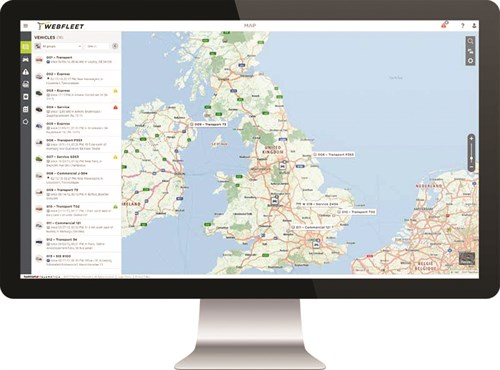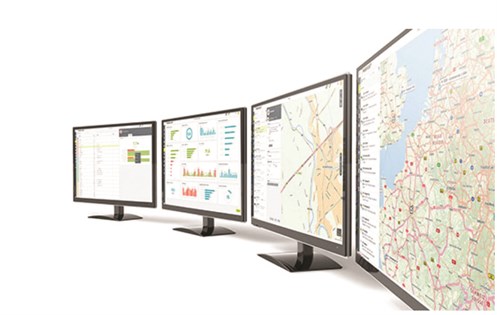Fleet managers have all manner of costs to contend with, but one of the biggest ones is fuel. Unfortunately, being such a valuable resource, fuel attracts criminal behaviour, and fuel card fraud has become a serious issue among fleets in recent years. There are many ways of detecting this type of criminal behaviour, but taking the data and making it into something meaningful is not always the most time-effective task.
In fact, new research commissioned by Shell has revealed that almost two thirds of fleet managers (65%) in the UK now see fuel-related fraud as a major issue for their business. The research also found that 48% of fleet managers agreed they need to do more to tackle the issue of fuel fraud, which could unlock fuel cost savings of more than 5%.
Without telematics and proper data analysis, identifying potential fuel card fraud in the fleet is difficult.
Fraud can come in many forms. For example, a fuel card assigned to one vehicle could be used to fuel another vehicle. With fleet management software, managers can check whether the location and time of every fuel card usage matches that of the vehicle.
If it doesn’t, they can take action.
“Basically, fleets put control of how fuel cards are used in the fleet manager’s hands,” explains Beverley Wise, sales director for the UK and Ireland at Tom Tom Telematics.
And many believe this is why fleets need tools to help them identify this type of fraud, especially with increasing amounts of data becoming available from cars.
“Telematics is crucial for monitoring fuel cards, amongst other things,” says Wise.
Telematics allows fleet managers to track their vehicles in real-time. By providing them with total visibility of everything that happens to every vehicle in their fleet, it lets them effectively monitor their drivers’ fuel card purchases.
“This way, they are sure that any misuse is detected in a timely manner and they have the tools to take preventive and corrective action,” Wise says.
Telematics software offers fleet managers insights across a number of areas. They can see where and when the fuel card was used, and they can see the cost of fuel purchases for each vehicle or the whole fleet.
“They can even break down the fuel by number of litres and by type and they can easily spot behaviour that indicates fuel card misuse,” Wise tells us.
As all fuel card data and fuel-related information is stored in the fleet management system, running a quick report to detect fuel card exceptions can be more simple than previously thought.
“As well as helping to identify fuel card theft, this also allows the fleet manager to make smarter operational decisions based on hard data to reduce costs and improve driver behaviour,” Wise notes.
Companies such as Tom Tom are able to offer an all-in-one solution, giving fleet managers secure access to all the information they need to manage their operation more effectively. Its platform, called Webfleet, keeps them connected with their team on the road and gives them access to real-time traffic information, so they can plan confidently and then adjust things on the fly if needed.

“With visibility over fleet performance, they can keep up with the current status of all vehicles and take action when needed,” Wise explains.
Webfleet also integrates fuel card information with vehicle location, fuel consumption, driver behaviour and vehicle maintenance data.
“This provides full visibility and control over how fuel is being used across the entire fleet in one easy-to-use interface,” says Wise.
Many companies, including those providing the fuel cards, are already working on solutions or technology that will attempt to limit fuel card fraud.
However, there have been significant increases in the activity of fuel fraudsters over the years. It is clear that fleets should be considering fraud prevention strategies to address multiple issues of fuel card fraud including misuse, slippage on non-fuel items, and stolen or skimmed cards.
Shell UK’s commercial fleet sales manager Scott McGregor tells us: “We recommend every fleet or road haulage operator establishes a full set of tactics for defending their business against fraud and, ultimately, reducing its impact on their bottom line.”
Unless a vehicle has an unrealistic workload, most company cars will visit the petrol station around once a week. Purchase intervals of less than this can be indicative of fraudulent activity and should be kept an eye on. While all these may cause red flags, there may be a genuine reason for more frequent fill-ups so it is important to keep that in mind too. Double billing can occur as an administrative error, but if you keep a close check on the frequency of your fleets fill-ups then you will soon spot any anomalies.
Allstar uses a bank-standard EMV telematics technology platform, meaning that it is able to offer protection against other, less secure technologies. With activity underpinned by both standard and bespoke reports to highlight exceptional usage, Allstar is able to provide control across more than 90% of the UK’s fuel stations.

“Fuel card fraud isn’t different to other forms of fraud, in that there is a constant challenge to stay ahead of the people taking advantage of this system,” Paul Holland, chief operating officer at Fleetcor, tells Business Car. “Given the strength of Allstar’s technology, we are uniquely placed to limit external fraud. Incredibly though, we still see instances of cards stolen from vehicles where the PIN has been written on the back of card, negating the most obvious fraud prevention.”
Talking about the company’s EMV platform, Holland explains that it minimises risk from legacy fraud such as card cloning. In addition, the platform enables businesses to take a strong level of control over fuel consumption by enabling customers to limit usage by time, spend, product types and frequency.
But despite efforts in the areas of card cloning and PIN fraud, internal fraud is an area that is arguably equally as difficult to manage, especially as company vehicle drivers need the ability to purchase fuel whilst on the road.
“Comparison reports across drivers, vehicles, vehicle types and locations with telematics all help to give companies much greater control and visibility over their fuel expenditure, and can help in identifying any anomalies quickly,” concludes Holland.
As well as some easy-fix aspects to look out for within the fleet, it is believed that technology is bringing to light new hope for fleet managers too. Telematics company Airmax says fleet card fraud will be a “thing of the past” thanks to emerging technology and telematics.
In a recent announcement, the company released the results of a survey that highlighted the potential for fleet managers to save through mpg monitoring. The company analysed data from its Airmax Remote Premium Plus solution and found greater accuracy of mpg calculations through the use of such a tool, compared with monitoring fuel performance from data provided by fuel card transactions.
“We firmly believe that the misuse of company fuel cards and exaggerated mileage claims are set to become a thing of the past,” Airmax remote managing director Richard Perham says. “Airmax Remote’s technology delivers complete accuracy and definitive reporting to identify fuel savings for fleet operators.
“We work with customers to provide insight into which of their drivers are most suitable for electric and plug-in vehicles by accurately monitoring existing fuel usage resulting from analysis of mapping, distances travelled and reasons for the journey,” he continues
The Masternaut Fuel & Maintenance Card has been designed to simplify claims and identify misuse, by combining fuel card data with Masternaut’s vehicle tracking data. It is seamlessly integrated with Masternaut Connect, Masternaut’s telematics platform, and provides automatic reporting on any discrepancies.
By combining the location of fuel card transactions with vehicle location data, Masternaut can identify when drivers are using their fuel cards for non-approved or unknown vehicles. Automatic reports highlight the purchase of premium fuel or non-fuel items.
Mike Hemming, Masternaut’s UK Catalytix director told Business Car, “Fuel represents a large chunk of a fleet’s operating cost, and it can be very time-intensive and manual to analyse fuel misuse and over-claiming. The true integration between Masternaut fuel cards and our Connect platform will cut your admin time by instantly highlighting any discrepancies straight to your inbox.”
Dhruv Parekh, Masternaut’s CEO, added, “We’re passionate about helping our customers be smarter about savings. Through automating manual tasks, lowering wasteful behaviour, reducing unnecessary claims, and through discounted maintenance pricing, many of our customers are seeing substantial savings. The holistic view Masternaut provides on distance travelled, fuel misuse, and mileage expenses enable businesses to reduce their fleet’s total cost of ownership.”
Similarly, BP Fuel Cards believes that technology has allowed credit card companies and fuel card suppliers to make huge leaps in security over the last few years, but fuel cards have the advantage of being a specialist tool.
“That doesn’t just mean giving fleet managers the ability to authorise, suspend or change PINs remotely, it means linking them into odometer readings whenever a fuel card is used,” says the company’s Andy Allen. “The result is accurate mpg figures based on the amount of fuel going into a vehicle, making it much more difficult to ‘fool’ the system.”
Allstar also works closely with a number of leading telematics providers to reconcile fuel purchased on fuel cards with fuel consumed by vehicles.
“We have data links with many telematics partners and regularly work jointly with customers to refine reporting to ultimately optimise control and identify anomalies quickly,” explains Allstar’s Holland.
This, coupled with the spending limits and maximum transactions that can be set on Allstar cards, is key to giving fleet managers peace of mind, he says.
Now, fuel cards are taking advantage of the age of ‘big data’. That is why BP Fuel Cards recently launched a new driver and fuel management platform called BP Fleetmove. Designed in partnership with Tom Tom Telematics, this enhanced driver and fuel management product is available in two iterations – the plug-in and go BP Fleetmove and the more advanced BP Fleetmove Pro.
“Essentially, it combines BP fuel card transaction details with vehicle and driver performance data via the Tom Tom Telematics Service Platform,” says Allen. “Easy-to-use mobile and desktop interfaces feed vehicle and driving information to fleet managers, helping them control costs and improve security.”
The reality is that fraud will always default to the weakest point in any system in a fleet.
“As a result, customers not using fuel cards are significantly more at risk from internal fraud, whether using bulk tanks or pay and reclaim expense recovery systems,” Holland adds.
Unfortunately, there is no fail-proof fraud prevention strategy, so it is important that fleets maintain vigilance by examining all fuel expense statements looking for anomalies. If signs are spotted early, then action can be taken and, if the suspicious occurrence proves to be misuse or fraud, it will enable your organisation to stop the problem from becoming even bigger.





